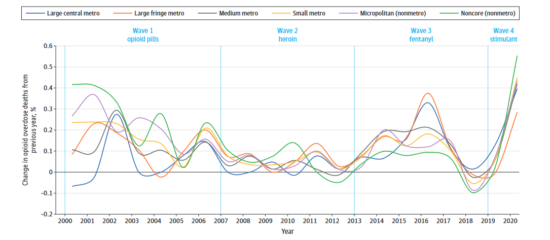Face shield failure, the next opioid wave, strawberries vs Alzheimer’s, and more
30 Jul 2022
Posted by Andrew Kantor
Teriparatide: All you need is just a little patience
Post-menopausal women dealing with osteoporosis can take teriparatide — but there’s an important note. The synthetic hormone will restore their bones’ mineral quality, but it has to be taken for 24 months — not fewer.
“[T]he full benefits of teriparatide treatment on forming bone quality are realized only with a full-course treatment,” said the leader of the Austrian team whose study figured this out.
And there’s good news: After two years, the women’s bone quality was “similar to that of healthy premenopausal women.”
UGA’s plan enters competition finals
Congrats to the team from the UGA College of Pharmacy, who — along with the University of Arkansas for Medical Sciences (last year’s winner) and University of South Carolina (don’t call it “USC”) — are finalists for NCPA’s 2022 Student Business Plan Competition.
It’s not clear what the next step is, but whatever it is, we’re pulling for the Dawgs! The winners will receive two cash prizes (amount unknown) — one for the team’s NCPA student chapter, and one for the team’s school to promote independent pharmacy. More importantly, they get a year of bragging rights.
* Technically the Good Neighbor Pharmacy NCPA Pruitt-Schutte Student Business Plan Competition (GNPNPSSBPC)
Fall booster plans
So here’s where we stand with Covid booster shots for the fall:
The FDA said that people under 50 won’t need a booster yet — it’s saying wait till the fall when Omicron-specific boosters are available.
To make sure they are available, the U.S. has arranged for 66 million doses of an updated version of Moderna’s vaccine.
Combined with 105 million doses the government already agreed to buy from Pfizer […] the latest deal puts the U.S. booster dose supply at about 171 million shots.
Shields up! (or not)
Transparent face shields are popular among the more cautious people when in a potential Covid-catching situation. They add an extra layer of protection without interfering with breathing or speaking.
Well, bad news. Turns out most of them don’t do much after all. British researchers put them to the test using a “coughing machine” (really) that spewed out dyed droplets onto shielded mannequin heads.
Result: “The lab tests showed that all of the face shields provided some protection, but none gave high levels of protection against external droplet contamination.”
That’s because there were gaps, and people turn their heads (and droplets get caught in air movement). You need a pretty big shield — “closed across the forehead and extended well around the sides of the face and below the chin” — to be effective.

This’ll work — flower not required
Ketchup can lead to dementia
That’s the headline I would use if I was running a tabloid. The reality is that “Eating More Ultra-processed Foods [is] Associated with Increased Risk of Dementia,” and ketchup happens to be one that’s mentioned.
Ultra-processed foods are high in added sugar, fat and salt, and low in protein and fiber. They include soft drinks, salty and sugary snacks, ice cream, sausage, deep-fried chicken, yogurt, canned baked beans and tomatoes, ketchup, mayonnaise, packaged guacamole and hummus, packaged breads and flavored cereals.
(Note that the article’s definition of “ultra-processed food” doesn’t quite jibe with the typicaldefinition. Add salt to peanuts and they’re “processed”; to be “ultra-processed” they need to have several additives, and possibly colors and flavors, too.)
I see trouble on the way
There have been three waves of opioid deaths over the past two decades — that’s the “opioid crisis.” We’re entering a fourth wave now, say researchers at Northwestern, and it’s going to be a bad one.
The first three waves were caused by (in large part) opioid pills, heroin, and fentanyl, respectively. The fourth wave is fueled by “combining synthetic opioids with stimulants such as cocaine and methamphetamines.”
“This is a bigger problem because you have people misusing cocaine and methamphetamines along with an opioid, so you have to treat two things at once, and the fentanyl is horribly volatile.”

Nutrition news
I hope they have lots of grains of salt at Texas Tech
First: “Peanuts Help Weight Loss, Blood Pressure, Glucose Levels” (funded by the Peanut Institute of Albany, Georgia).
Second: “Daily Avocados Intake Improves Diet Quality, Lowers Cholesterol Levels” (funded by the Avocado Nutrition Center).
But what about strawberries?
A study out of Rush University found that strawberries — actually, a compounded they contain called pelargonidin — might reduce the risk of Alzheimer’s by reducing the “neurofibrillary tau tangles” in the brain: “The data suggests that pelargonidin may protect the aging brain from developing Alzheimer’s disease pathology.”
“We suspect the anti-inflammatory properties of pelargonidin may decrease overall neuroinflammation, which may reduce cytokine production.”
Notice all the “mays” and “mights”? Yeah, this is a bit preliminary.
The big question here at Buzz HQ: Who funded the study? It would cost €27.50 to find out, which is €27.50 more than our budget for scientific papers.
Not everyone’s worried about healthcare privacy
Results of a survey released by the American Medical Association found there’s a small percentage of Americans with very interesting views about their healthcare data.
- Almost 8% do not believe privacy is a right, and are okay with having their health data available for purchase.
- 6% of patients don’t think companies need to be held legally accountable for how their health data is used.
- 7% don’t care if app developers tell them how those apps might use and share their personal health data.
- More than 20% don’t care if they can’t opt out of sharing some or all their health data with companies.
- 41% aren’t worried about their personal health data being used against them or their loved ones, e.g., for insurance coverage, employment, or legal reasons.


